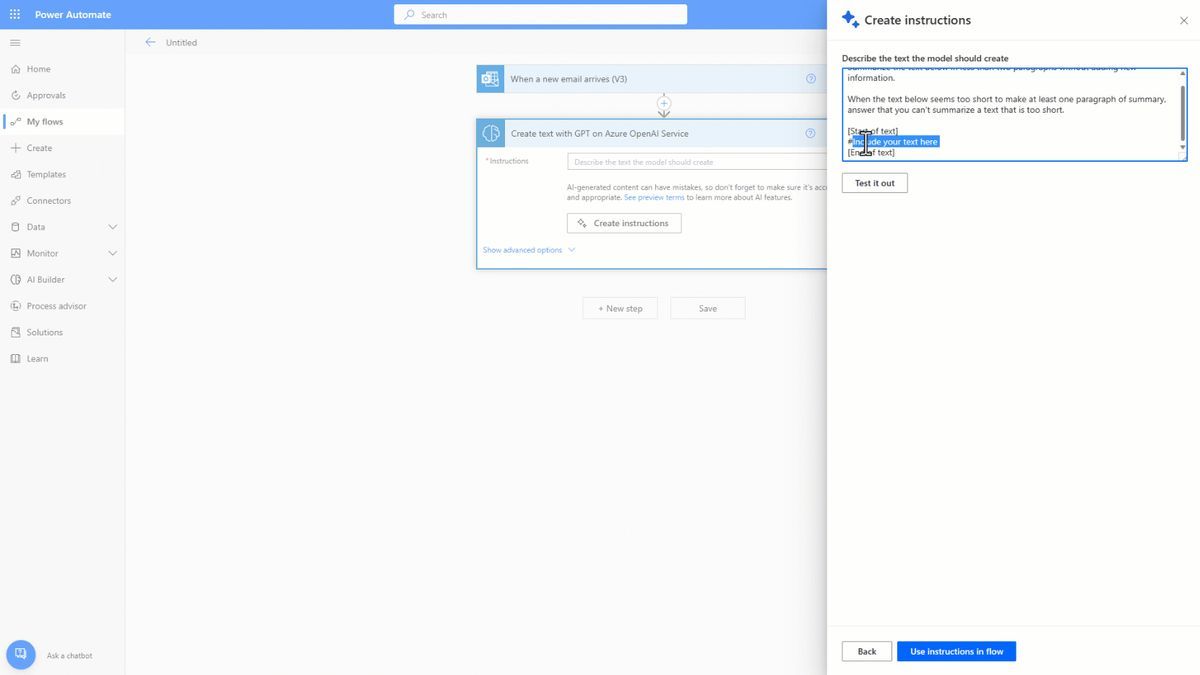- Microsoft has announced a new set of AI product updates for its business apps portfolio, aimed at automating repetitive tasks and streamlining workflows.
- The updates touch on both Power Platform and Dynamics 365, with Copilot being a new AI feature that can automate some of the more repetitive sales and customer service tasks, such as generating email responses to customers and creating an email summary of a Teams meeting in Outlook.
- Copilot can also help marketers receive suggestions about customer segments that they might not have previously considered, and generate ideas for email campaigns.
- Microsoft’s new AI capabilities are powered by technology from OpenAI and built using the Azure OpenAI Service, which provides enterprise-tailored access to OpenAI’s API.
- Copilot will be included in existing Dynamics 365 licenses at no additional cost and will launch in preview on March 6th, with general availability to follow at a later date.
Microsoft has announced the release of its latest AI product updates, which the company describes as the “next generation” of its business apps portfolio. The updates include enhancements to both Power Platform and Dynamics 365, Microsoft’s suite of enterprise resource planning (ERP) and customer relationship management (CRM) tools.
Microsoft 365 Copilot is introduced
In a recent interview with TechCrunch, Charles Lamanna, the Corporate Vice President of Business Apps and Platform at Microsoft, stated that these updates represent the logical next step in Microsoft’s automation journey. The new capabilities are powered by technology from AI startup OpenAI and were built using Microsoft’s Azure OpenAI Service, which provides enterprise-tailored access to OpenAI’s API. These latest updates follow the rollout of OpenAI text-generating AI models in Power Platform four years ago and the recent introduction of generative AI capabilities in Viva Sales, Microsoft’s seller experience app.
According to Charles Lamanna, Microsoft’s Corporate Vice President of Business Apps and Platform, the company has been working towards bringing generative AI and foundation models to the workplace for the past four years. Microsoft has had a long-standing partnership with AI startup OpenAI to commercialize its technology in Microsoft’s own products and through the Azure OpenAI Service. In an email statement, Lamanna noted that the company has now reached a critical milestone where the technology and product can deliver transformative outcomes for customers.

Microsoft is introducing a new feature in Dynamics 365, called Copilot, which takes inspiration from GitHub’s Copilot service. The goal of Copilot is to automate some of the more repetitive sales and customer service tasks.
In Dynamics 365 Sales and Viva Sales, Copilot can help generate email responses to customers and create an email summary of a Teams meeting in Outlook. Charles Lamanna explains that the meeting summary feature pulls in details from the seller’s CRM, such as product and pricing information, and combines them with insights from the recorded Teams call. The aim of this new feature is to streamline workflows and increase efficiency in sales and customer service operations.
“We securely and intelligently access information from customers’ CRM, ERP and other enterprise data sources at runtime. We use large language models to combine the enterprise data with underlying knowledge to produce responses tuned for each customer. Importantly, we don’t use customers’ data to train the models,” Lamanna stated.
Meanwhile, in Dynamics 365 Customer Service, Copilot can generate “contextual answers” to customer inquiries via chat or email and provide an “interactive chat experience” for customer service agents that draws from knowledge bases and case history.
These capabilities complement the new “conversation boosters” feature in Power Virtual Agents, which enables companies to connect their chatbots to resources such as websites or knowledge bases to respond to questions that the bot has not been trained on. Additionally, Microsoft’s AI Builder tool now includes a new “GPT” model that allows organizations to embed text-generation features into their Power Automate and Power Apps solutions.
According to Lamanna, this new model can be used in various scenarios such as summarizing text from weekly reports for a researcher or generating targeted content ideas for a marketing manager based on specific keywords or topics. These new features are designed to enhance productivity and reduce manual effort across various business functions.
With Microsoft’s recent entry into generative text technology, such as Bing Chat, some may be hesitant to use the company’s technology for their applications, fearing that it may malfunction or cause errors. However, Charles Lamanna reassures users that the new conversation boosters and GPT model, as well as Copilot, are based on each customer’s CRM, ERP, and other data sources, ensuring that they are grounded in reality. By leveraging existing data sources, these AI tools can provide accurate and relevant responses to customer inquiries and automate repetitive tasks, freeing up time for employees to focus on more high-value work.

“AI-generated content is always clearly labeled, and users are encouraged to verify the accuracy before using it. When relevant, we also cite the sources from which the answer was retrieved to better enable the user to verify the accuracy of the response. We have monitoring and controls in place to allow us to quickly respond with manual intervention in case any issues slip through the above lines of defense,” Lamanna stated.
It is important to note that users may still have to verify the accuracy of the content generated by AI tools like Copilot, and studies on automation bias suggest that users may be prone to placing too much trust in AI. However, the rest of Copilot’s capabilities are less likely to pose such potential issues.
For instance, in Dynamics 365 Customer Insights and Dynamics 365 Marketing, Copilot can provide marketers with suggestions for customer segments they may not have previously considered, allowing them to create target segments by describing the segment in their own words.
The tool can also generate ideas for email campaigns by pulling from an organization’s existing marketing emails and a range of internet sources, based on marketers’ requests. Overall, Copilot’s capabilities are designed to assist businesses in streamlining and automating a range of functions, with the potential to enhance productivity and reduce manual effort.
Microsoft may be playing catch-up in some areas, as its main competitor in the CRM market, Salesforce, has been incorporating AI-powered capabilities into its CRM products for years. Additionally, startups like Glint have embraced AI to automate customer service workflows. However, as more marketers plan to integrate AI into their content strategies, what may be more important than who is first to market with these capabilities is who can deploy them at scale.
The ability to deploy AI at scale can provide businesses with a significant competitive advantage, enabling them to improve operational efficiency and enhance customer experiences. Therefore, while Microsoft may be trailing behind in some respects, the company’s recent AI product updates, including Copilot, demonstrate its commitment to keeping up with industry trends and delivering transformative outcomes for customers.
“CRM and ERP have long been mission-critical customer and business data sources; however, they frequently require burdensome tasks like manual data entry, content generation and notetaking. Dynamics 365 Copilot automates these tedious tasks and unlocks the full creativity of the workforce,” Lamanna stated.
Copilot’s capabilities extend beyond sales operations to the e-commerce space, with Dynamics 365 Business Central offering a tool to streamline the creation of e-commerce product listings. According to Charles Lamanna, Copilot can generate product attributes such as color, material, and size, along with descriptions that can be customized by adjusting factors such as tone of voice, format, and length.
This feature is similar to Shopify’s recently introduced AI-generated product descriptions tool, which Lamanna indirectly acknowledged. He mentioned that Business Central customers using Shopify can publish products with AI-generated descriptions to their Shopify store in just a few clicks, but he also emphasized the importance of reviewing these descriptions for accuracy. This capability can save businesses time and effort in creating product listings while also improving the quality and consistency of the descriptions.

In addition to its capabilities in the e-commerce space, Copilot in Microsoft Supply Chain Center can leverage AI to proactively flag issues that could potentially impact supply chain processes, such as weather, financials, and geography. Copilot can then automatically draft an email to alert any affected partners, providing supply chain planners with greater visibility and control over their operations.
Charles Lamanna highlights that even simple AI-imbued processes like these, which automate emails, can have a significant impact on productivity. By reducing the manual effort required for tasks like email notifications, Copilot can enable businesses to allocate resources more effectively and focus on higher-value activities. These new capabilities demonstrate Microsoft’s commitment to leveraging AI to enhance productivity and efficiency across various industries.
“According to our recent survey on business trends, 9 out of 10 workers hope to use AI to reduce repetitive tasks in their jobs. AI-powered assistants are now table stakes for business apps. We believe Dynamics 365 Copilot will help employees get work done faster so organizations can spend more time on the creative, innovative aspects of their jobs — like building long-term customer relationships,” Lamanna stated.
While some marketing fluff may obscure the true impact of Microsoft’s new AI product updates, it is evident that the company remains committed to investing in AI and automation. Microsoft’s recent investment of billions in OpenAI, announced in January, demonstrates the company’s eagerness to see a return on investment. Copilot will be available to customers with existing Dynamics 365 licenses, such as Dynamics 365 Sales Enterprise and Dynamics 365 Customer Service Enterprise, at no additional cost. The tool will launch in preview on March 6th, with general availability to follow at a later date. These new AI capabilities are part of Microsoft’s broader strategy to help businesses streamline operations, improve customer experiences, and drive productivity through the power of AI.
The AI race seems neverending. Before you leave, don’t forget to check out the biggest ChatGPT rivals!





